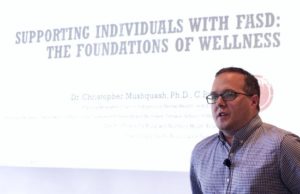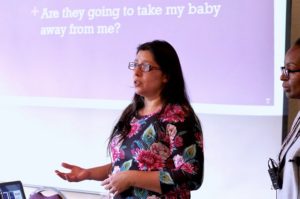Anishinabek keynote speakers bring cultural conceptualizations of wellness at FASD forum

By Rick Garrick
THUNDER BAY—Pays Plat’s Christopher Mushquash and Wiikwemkoong’s Lisa Bishop were among the presenters at the Ontario Native Women’s Association (ONWA) FASD (Fetal Alcohol Spectrum Disorder) Forum in Thunder Bay.
“For me, it was a real privilege to be able to speak with ONWA and the folks who are working with our people with FASD,” says Mushquash, clinical psychologist at Dilico Anishinabek Family Care and associate professor at Lakehead University. “Trying to bring cultural conceptualizations of wellness in with and understanding how psychological principles and psychological concepts align, and then trying to boil that down to the practical ways in which we can support our people who have these difficulties is something I spend a lot of time thinking about. So to be able to work with a group who thinks about that also is always a real privilege and a nice opportunity for me.”
Mushquash spoke about the importance of sleep, physical activity, structuring of time and diet as building blocks of wellness during his keynote presentation, which he delivered on the second day of the Oct. 11-12 forum at the Best Western Plus NorWester Hotel and Conference Centre near Thunder Bay.
“Those things are so profoundly important for your overall wellness and mental health,” Mushquash says. “So for example, disrupted sleep in our urban work cultures is actually seen as virtuous sometimes. But it is not really virtuous, it is disrupting to things. And when sleep goes, a whole bunch of other things go too. Mood starts to go down, anxiety starts to go up, and if your sleep is disrupted for a long enough period of time you will actually go psychotic.”

Bishop, an Indigenous midwife with Dilico, spoke about her role as a midwife during the Indigenous Maternal and Child Health presentation she delivered on the first day of the forum along with Naana Jumah, an obstetrician and gynecologist with Thunder Bay Regional Health Science Centre.
“There is such a complex array of things that I deal with in my work as a midwife,” Bishop says. “One of the biggest things I work on is making sure I can help women get adequate prenatal care and having all the screening they need during the pregnancy. It’s not just medical, prenatal clinical care that we’re giving, it’s also all the social dimensions we have to look at in order to get a woman to a place where she is able to go home with her baby.”
Bishop also raised the social determinants of health that impact how Indigenous women access health care.
“There is quite a high rate of poverty with Indigenous populations, and that has a lot of implications for obtaining health care,” Bishop says. “Having adequate housing is a real big priority, so if a family doesn’t have adequate housing then a lot of the other aspects of their life can be quite tumultuous.”
Bishop adds that access to adequate food and transportation to health care facilities are also “big challenges” for Indigenous women.
“Ideally we would like to see somebody during their pregnancy in the first trimester, so before 12 weeks, because there is a lot of health information we need to get and screening that we do,” Bishop says. “It helps us accurately date pregnancies and if they need any nutritional supplements like iron, make sure they are on prenatal vitamins, and doing genetic screening.”
The FASD Forum also featured an FASD Awareness Workshop by Maureen Parks, FASD coordinator with Norwest Community Health Centre, and breakout sessions with key questions, group work, sharing and feedback.

